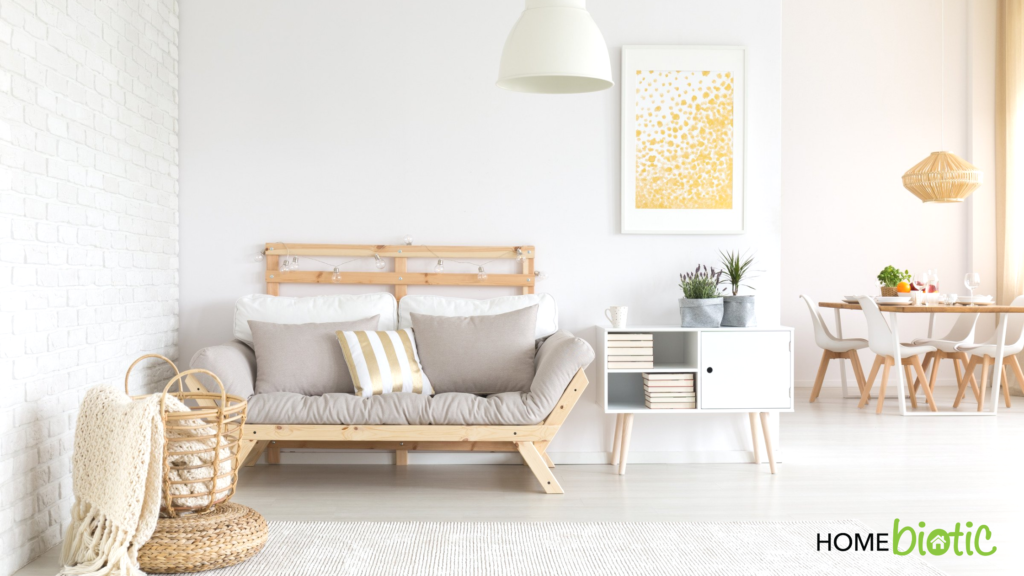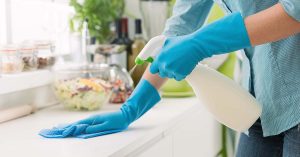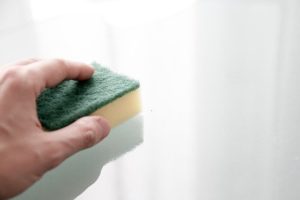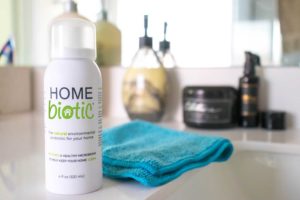
Do you know how to nurture your home biome like we nurture our gut biome? The last decade, we’ve heard more evidence about how the gut microbiome is key to our health and well being. If we’ve learned anything about environmental science, we know that a microbiome is an environment as well. In fact, our gut environment works together with all microbes to protect and maintain the gut’s health (1). Subsequently, this helps preserve and protect our health.

But did you know that our home is also a microbiome? Just like the gut, the home has a host of microbes that need each other to keep the house clean and healthy. More and more, we’re learning that to nurture environments means to create balance and future stability, whether that environment is internal or external (2).
Since all living things exist in a symbiotic relationship with other living things, it seems straightforward that our bodies and homes co-exist (3). We’re doing better at nurturing our gut biome, but what about our home biome?
The truth is, most people don’t know how to maintain and nurture their home microbiome. However, it’s surprisingly easy, and once you understand how, you’ll be able to nurture your home microbiome as easily as you would your gut biome. Here are 3 easy ways you can nurture your home biome:
 Choosing The Right Cleaning Supplies Will Decrease The Death of Healthy Microbes
Choosing The Right Cleaning Supplies Will Decrease The Death of Healthy MicrobesLet’s compare a home microbiome to the gut microbiome. There’s one thing we know that decimates healthy microbes – antibacterial substances. We know that taking antibiotics (even though it may be necessary for an infection) will kill off beneficial gut microbes. The same happens in our homes (3,4).
In circumstances like infections or outbreaks of dangerous microbes, we would definitely need to use antibiotics and bacteria-killing substances. However, we need to proceed with caution and not go overboard.
If we use copious amounts of harsh antibacterial chemicals to clean our homes, we will lose all our friendly microbes (3,4). Instead, we can choose less harsh cleaners that will keep our homes fresh, reduce harmful microbes, but will spare the healthy ones. Using things like vinegar, essential oils, or environmentally friendly cleaners will help.
If we use copious amounts of harsh antibacterial chemicals to clean our homes, we will lose all our friendly microbes Share on X Less Cleaning Will Enhance The Growth & Health of Your Home Microbiome
Less Cleaning Will Enhance The Growth & Health of Your Home MicrobiomeHowever, even if you use less harsh cleaners, you can still kill off too many good guys if you clean too frequently (4,5). A good rule of thumb is to clean once a week with the cleaners mentioned above. If your home feels too dusty, you can always just wipe surfaces with water rather than using cleansers.
Again, if you’ve had an outbreak of salmonella or dangerous mold growth, of course, you will need to take care of it. But in the absence of those issues, there’s no need to over-clean.
If you think about it, we never “clean” our guts. At times we may need antibiotics to “clean” out microbes that could be making us sick, but other than that, we don’t think about cleaning our guts. Our home environments do get cluttered, dusty, and full of grime. But really, it’s only the grime that may need cleansers. Everything else just needs tidying up and wiping with a damp cloth.
Our home environments do get cluttered, dusty, and full of grime. But really, it's only the grime that may need cleansers. Everything else just needs tidying up and wiping with a damp cloth. Share on X Adding More Soil-Based Microbes Acts Like a Probiotic
Adding More Soil-Based Microbes Acts Like a ProbioticMost people don’t know this, but a little dirt is actually good for you, and it’s also good for your home. Dr. Josh Axe writes about the benefits of soil-based microbes in his book “Eat Dirt.” He says that we can re-establish the symbiotic relationship that we’ve always had with them by increasing our exposure to diverse microbes (6). This relationship keeps us healthy and shapes our immune system. Certain microbes not only keep harmful microbes at bay, but they also strengthen our immune systems (6).
For a while, we only focused on enhancing our guts’ microbial diversity, but this is also essential in our home environments. In the book “Never Home Alone,” biologist Rob Dunn looks at the variety of microbial, insect, and animal life alive in most homes. He noticed that many illnesses in modern society increased simultaneously as the microbial life inside of modern homes decreased (5).
It seems that the more we nurture our relationship with soil-based microbes, the more we create balance and health in our homes, which, in turn, enhances our health. Perhaps a new version of “clean” in our homes is one where we allow a bit of outside dirt to come in. Playing in nature with pets and other humans will naturally bring outside soil-microbes into the home (4). We can also explore the use of home probiotics that foster our microbial relationship (7). Our Homebiotic Probiotic Spray is the perfect way to add soil based probiotics to your home, keeping it balanced & fresh!
It seems that the more we nurture our relationship with soil-based microbes, the more we create balance and health in our homes, which, in turn, enhances our health. Share on XThese are the top three ways to nurture our home microbiome. It’s time we think of our home health in a similar way as our gut health. Instead of creating an overly clean and sterile environment, we can strive for a more balanced approach.
Of course, no one wants a dirty home that smells bad. But maybe the definition of a clean house is one that includes a more natural and symbiotic relationship with the world we live in. Perhaps a clean home is one that allows some microscopic dirt to accumulate without the use of harsh cleaners.
By nurturing our home microbiome, we create a healthy environment that goes back to the basics before the advent of bleach and antibacterial cleansers. As humans, we depend on our home environments’ symbiotic relationship, just as our gut microbes rely on us for their home environments. In this way, a healthy home microbiome is a part of promoting our personal wellness too.
https://www.wholebodymicrobiome.com
https://royalsocietypublishing.org/doi/full/10.1098/rspb.2015.1139
https://www.sciencedirect.com/science/article/abs/pii/S0013935115000304
https://journals.plos.org/plosone/article?id=10.1371/journal.pone.0064133
https://robdunnlab.com/science-portfolio/never-home-alone/
https://www.panmacmillan.com/authors/dr-josh-axe/eat-dirt/9781509820955

Gillian is a former nurse and joined the Homebiotic team as a researcher & science writer. She loves traveling the world and currently lives in Colombia.